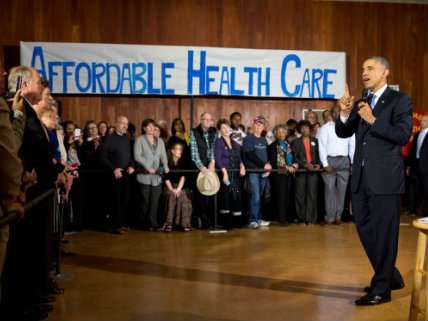States Might Be Illegally Using Federal Funding to Operate Obamacare Exchanges
Inspector General issues warning about possible misuse of health law grants.

The state-run exchanges that were set up under Obamacare were almost entirely funded through federal grants. Those grants, which totaled some $5 billion, were provided to plan, design, build, and launch the state exchanges. But once the exchanges were up and running, the states were on their own. The federal funding was for startup costs—not ongoing operations.
It's been clear for months now that many of the states that chose to build their own exchanges don't have yet have a way to continue fully funding regular operations. As the Associated Press reported last November, several states have implemented fees and taxes on health insurance premiums, including those not sold through the exchanges, while others have opted to spend money out their general funds.
But at least in the short term, some states were planning to rely on federal funding, held in reserve to cover projected shortfalls over the next few years. "California's exchange said it was setting aside $184 million in federal money to fight off projected budget shortfalls through 2016," according to the AP. The same report noted that officials in Vermont "acknowledged it could face a $20 million shortfall by year's end," despite a tax on the state's providers tagged for funding the exchange. "The state hopes pending federal grants will fill the gap," the AP said. Officials in Rhode Island were reportedly planning "to continue using federal money through 2015. Beyond that, the funding mechanism is unclear."
There are two problems with this plan. The first is that it's not sustainable. Even with operational cutbacks, eventually the federal money, the last of which was given out in December of 2014, will run out.
The second is that it may well be illegal.
As Bloomberg Business reports this morning, the Affordable Care Act "mandated that those [state-run] marketplaces find ways to fund themselves by Jan. 1, 2015, and that the grant money can't be used for operations after that point."
Indeed, according to a cautionary letter sent this week by the Inspector General for the Centers for Medicare and Medicaid Services, the federal agency tasked with managing the exchange grants, states may already be misusing those funds.
"We have concerns that, without more detailed guidance from CMS, [state-run exchanges] might have used, and might continue to use, establishment grant funds for operating expenses after January 1, 2015, contrary to law," the letter warns. "This issue is a significant matter and requires CMS's immediate attention."
As Bloomberg notes, the letter is not a full audit, so the extent of the problem isn't known.
Nor is it entirely clear just what sort of spending counts as an "operational expense." The IG letter points out that "rent, software maintenance, telecommunications, utilities, and base operational personnel and contractors" are definitely out of bounds, but notes that there is no guidance about spending on call centers or other enrollment assistance.
But the Associated Press report from November strongly suggests that several states are, at a minimum, relying on legally murky funding to continue operations. And that points to a serious challenge for states that intend to continue running their own exchanges: It's already going to be a challenge to fund operations; if leftover federal funds are cut off too, that will make the challenge even more difficult.


Show Comments (14)